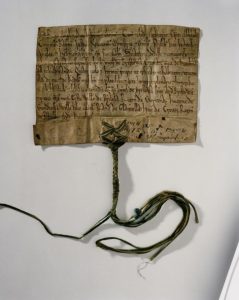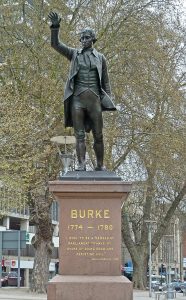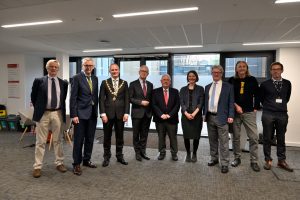By Professor Brendan Smith, Professor of Medieval History
When we think of British cities with strong Irish links it is likely to be Liverpool, Glasgow, Manchester, Birmingham and London that first come to mind. In terms of historical longevity, however, no city on this island can match Bristol’s connections with Ireland.
The medieval connections
2021-2 marks the 850th anniversary of the conquest of Ireland by King Henry II of England. During his stay in Dublin at Christmas 1171, the king issued an extraordinary charter whereby he granted Dublin to ‘my men of Bristol’ and gave them permission to colonise their new possession.

Links between the two towns were already strong by this time. Ham Green pottery, manufactured on the banks of the Avon near Pill, was popular in Viking Dublin, and the vigorous trade in slaves conducted between Dublin and Bristol in the eleventh century inspired bitter criticism from churchmen before William the Conqueror and his successors brought this vile commerce to an end. After 1171, many important trading families from Bristol established branches across the Irish Sea, while stone quarried at Dundry, to the south of the city, was transported in large quantities to Ireland for use in the new churches and monasteries that the English began to build.
King Henry II issued an extraordinary charter whereby he granted Dublin to ‘my men of Bristol’ and gave them permission to colonise their new possession.
In February 2022 a symposium focusing on the medieval ties between the two towns was held in Dublin to mark the anniversary of Henry II’s grant. The Deputy Lord Mayor of Dublin welcomed the Lord Mayor of Bristol to the event with a certain wariness, since the original charter of 1171 was never officially revoked!
The age of Edmund Burke and beyond

(Credit: Tim Green, Wikimedia Commons, CC BY 2.0)
In Bristol, on 20 April 2022, the University hosted the ‘return match’, with a symposium considering more recent ties between Dublin and Bristol, beginning with the career of the great political philosopher Edmund Burke (1729-1797). Burke was born in Dublin and was educated at Trinity College Dublin before developing a successful political career in England. Between 1774 and 1780 he was MP for Bristol, though his views on a range of issues made him unpopular with the city’s ruling elite. Two fine statues of Burke can still be seen today, one outside the gates of Trinity College Dublin, and the other on St Augustine’s Parade in the centre of Bristol, a few metres in front of the now empty plinth where Edward Colston’s statue once stood.
The University hosted the ‘return match’, with a symposium considering more recent ties between Dublin and Bristol.
The celebratory event
The University was delighted to welcome Ireland’s Ambassador to the UK, Mr Adrian O’Neill, at the recent event, who spoke warmly about the opportunities the day had provided to further strengthen links between Bristol and Dublin. In addition, Professor Martyn Powell (Head of the School of Humanities), Dr Erika Hanna, of the Department of Historical Studies, and Professor Steve Poole of the University of the West of England delivered academic papers and a guest lecture was given in the evening by Professor David Dickson of Trinity College Dublin. To coincide with the event, an exhibition was staged at the venue, displaying some of the important Irish-related materials held in the University of Bristol’s Special Collections department. This included early editions of some of Burke’s published works, as well as a sample of Irish political pamphlets dating from between the eighteenth century and the Easter Rising of 1916. The close ties that have existed between the University of Bristol since its foundation and Trinity College Dublin were also explored in some of the exhibited material.
The future
Following the guest lecture a reception was hosted by the Vice-Chancellor, Professor Hugh Brady, whose Irish background provided a fortuitous link to the day’s events. Professor Brady welcomed to the University Ambassador O’Neill, the Deputy Lord Mayor of Dublin, Councillor Joe Costello, the Lord Mayor of Bristol, Councillor Steve Smith, and members of the Bristol Irish Society. Councillor Costello promised that on his return to Dublin he would continue to work with his counterpart in Bristol to bring about a new twinning arrangement between the two cities. Reviving awareness of the historical links between Bristol and Dublin seems likely to lead to their further strengthening in the years ahead.

From left to right: Professor David Dickson (Trinity College Dublin); Ambassador Adrian O’Neill; Bristol Lord Mayor Steve Smith; Professor Hugh Brady (University of Bristol’s Vice-Chancellor); Deputy Lord Mayor of Dublin Joe Costello; Dr Erika Hanna (University of Bristol); Professor Brendan Smith (University of Bristol); Professor Steve Poole (University of the West of England) and Professor Martyn Powell (University of Bristol).
Brendan Smith, Professor of Medieval History, is a Dubliner who was educated at Trinity College Dublin. He took up a lectureship at the University of Bristol in 1993. He has published extensively on the links between England and Ireland in the Middle Ages, and in 2018 edited volume I of the four-volume Cambridge History of Ireland, which was launched in Washington, D.C. in September 2018 by Joe Biden, now the president of the United States of America. Professor Smith is currently engaged in research projects examining the financing of English rule in medieval Ireland, with an emphasis on the deployment of Digital Humanities techniques and methodologies. He has received funding from The Jean Golding Institute to work with Mr Mike Jones, from Research IT, on the production of visualisations of the financial data contained in medieval Irish exchequer material. He will be presenting some of the fruits of this collaboration at the Bristol Data and AI Showcase at the MShed on 7 June 2022.

